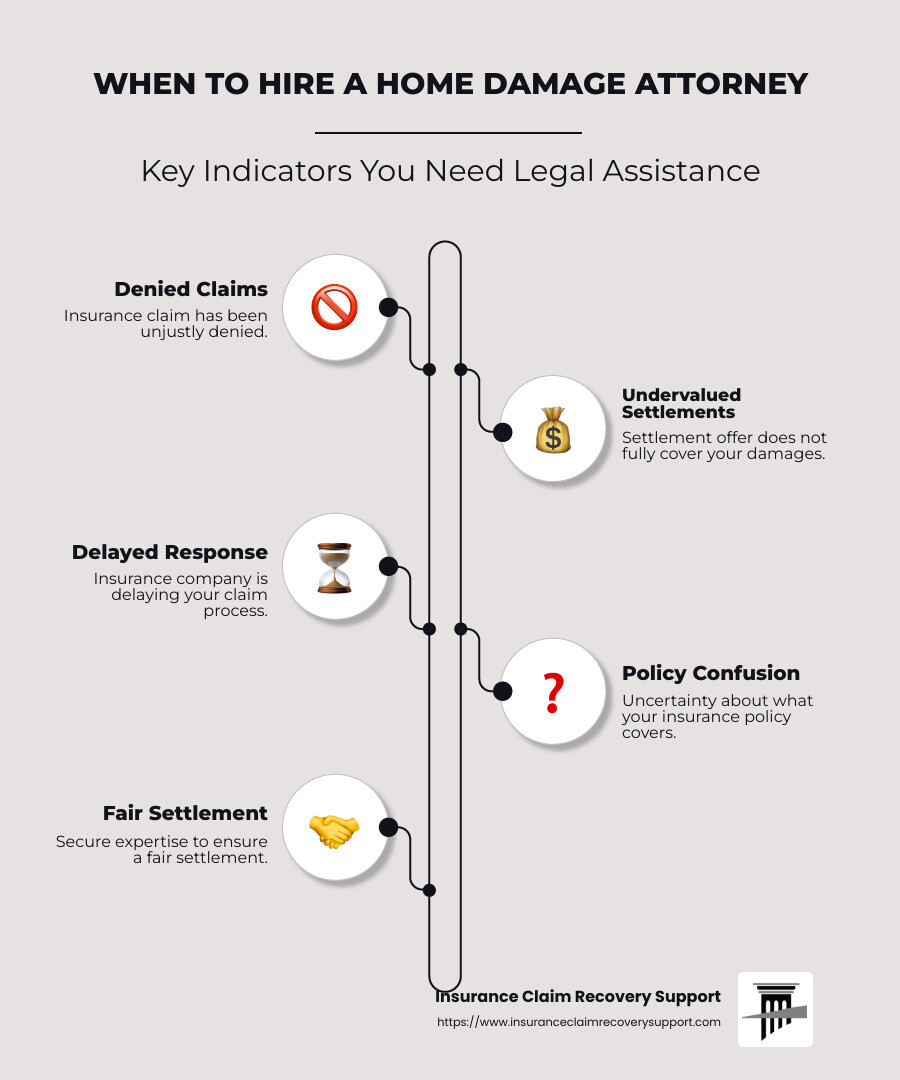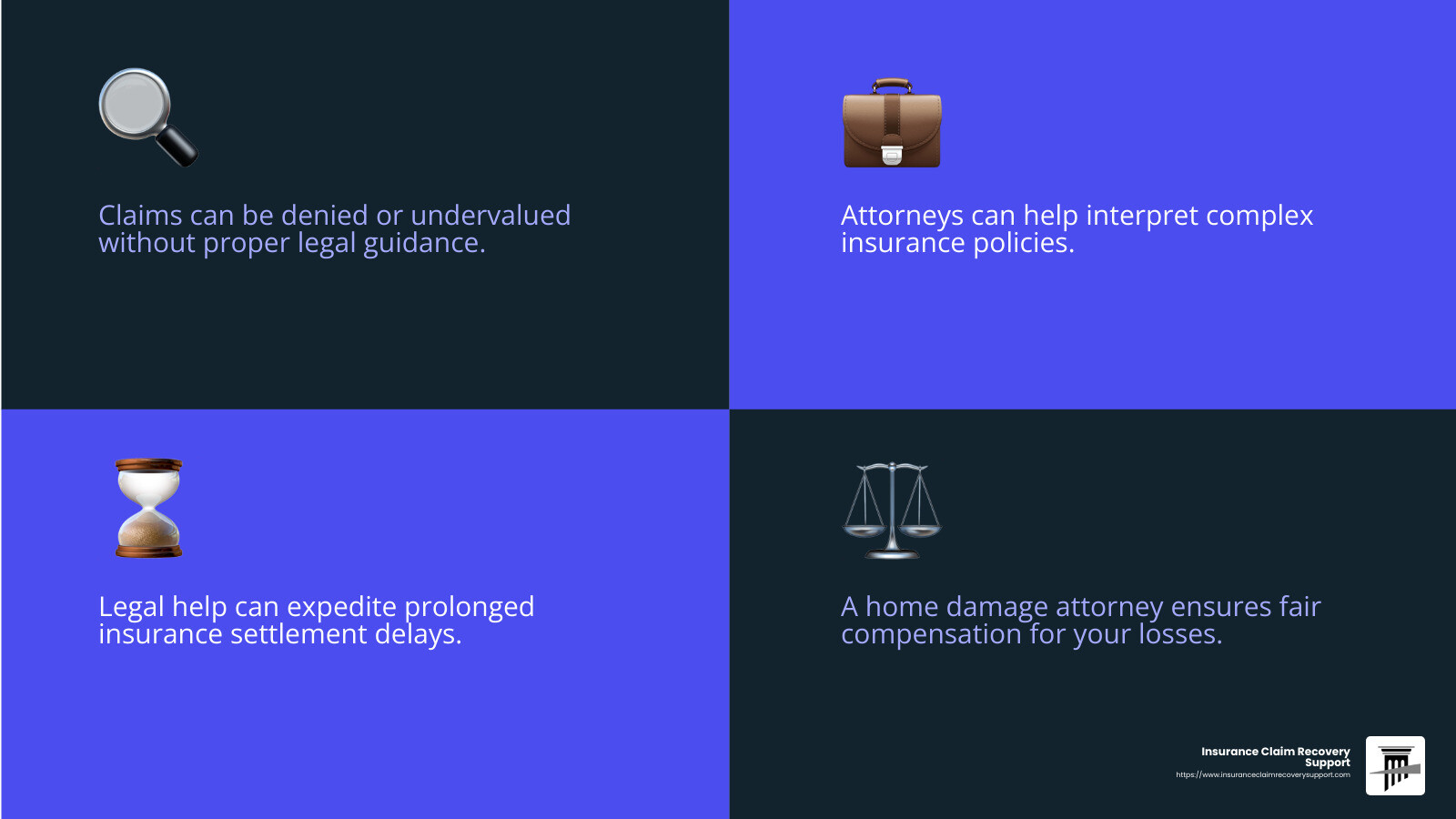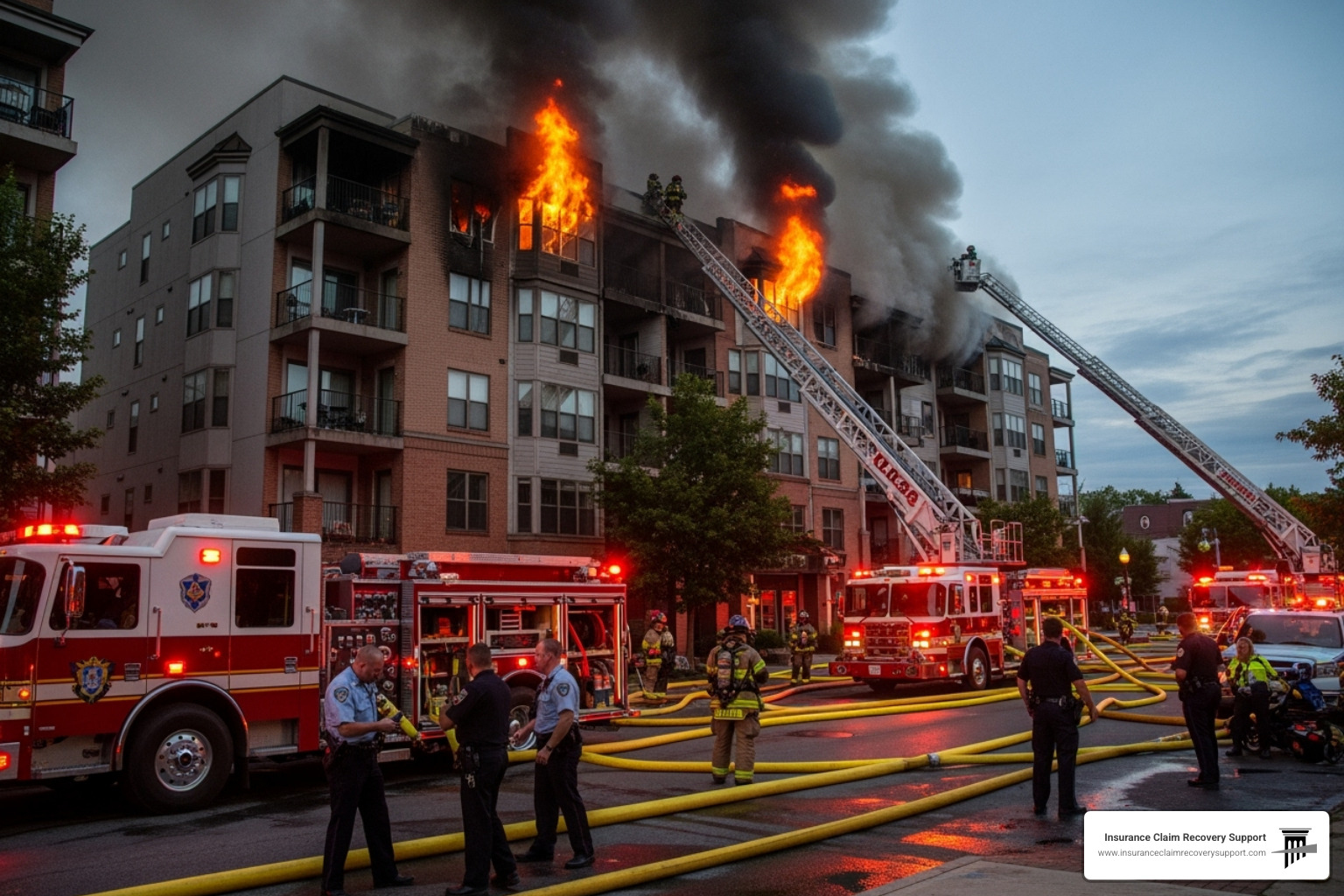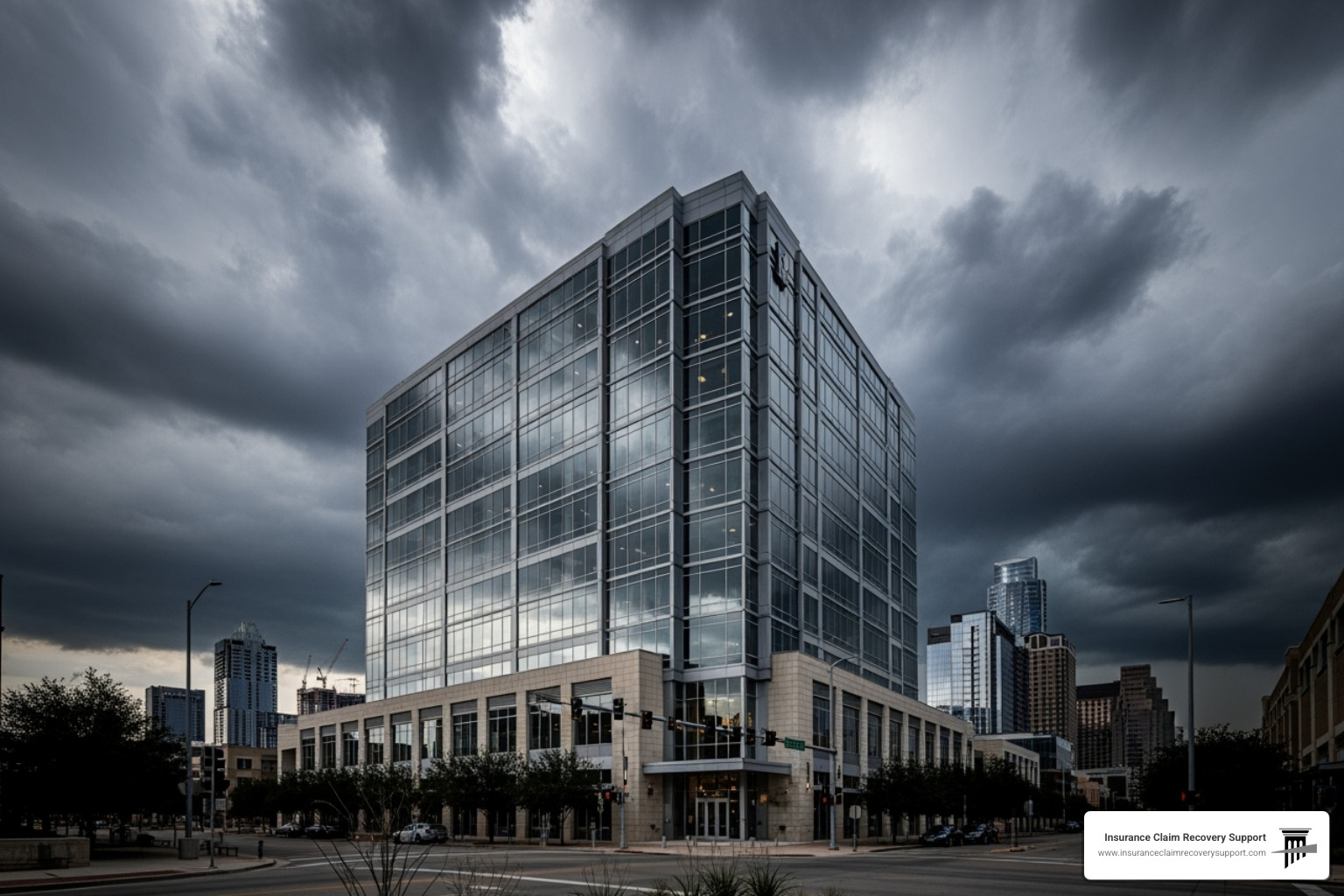If you’re dealing with significant property damage, knowing when to seek help from a home damage attorney can make all the difference. Here’s a quick checklist to guide you:
1. Denied Claims:
– Has your insurance claim been unjustly denied?
2. Undervalued Settlements:
– Are you receiving a settlement offer that doesn’t fully cover your damages?
3. Delayed Response:
– Is your insurance company delaying your claim process?
4. Policy Confusion:
– Unsure about what your insurance policy actually covers?
Facing property damage can be overwhelming, whether caused by storms, fires, or other unforeseen events. Insurance companies can make the situation even more challenging with delays, underpayments, or wrongful denials. This is where legal assistance becomes crucial, providing you the expertise to steer these complexities and secure a fair settlement.
I’m Scott Friedson, a multi-state licensed public adjuster and CEO of a large loss public adjusting firm. I have settled over 500 large loss claims valued at more than $250 million. My experience and dedication to policyholder advocacy ensure that you have the professional support needed when seeking fair settlement for property damage.

Next, we will dig deeper into the different types of home damage claims and how to handle them effectively.
Terms related to home damage attorney:
– personal property damage lawyer
– property damage claim attorney
– property insurance attorney
Understanding Home Damage Claims
Navigating home damage claims can be complex, but understanding the basics can simplify the process. Let’s break down the types of home damage and common insurance claims you may encounter.
Types of Home Damage
Natural Disasters:
Natural events like hurricanes, tornadoes, and earthquakes can cause extensive damage to homes. While wind damage is often covered by standard homeowners insurance, flood and earthquake damage typically require separate policies.
Plumbing Issues:
Burst pipes and leaks can lead to significant water damage. Most policies cover sudden and accidental water damage, but not gradual leaks due to poor maintenance.
Fire Damage:
Fires can destroy homes and belongings. Insurance usually covers fire and lightning damage, but it’s crucial to document everything for your claim.
Vandalism:
Intentional damage, such as graffiti or broken windows, falls under vandalism. These acts are generally covered by homeowners insurance.
Subsidence:
Subsidence occurs when the ground beneath a property sinks, causing structural damage. This is less common and may require additional coverage.
Common Insurance Claims
Storm Damage:
Storms can wreak havoc on your property, leading to claims for wind and water damage. Between 2014 and 2018, wind was the most common cause of insurance claims.
Water Damage:
Aside from storms, water damage often results from plumbing issues. It’s essential to act quickly to prevent mold and further damage.
Fire and Lightning:
While less frequent, fire and lightning claims are among the most costly. They averaged $78,838 between 2015-2019, according to the Insurance Information Institute.
Theft-Related Events:
Burglaries can lead to claims for stolen or damaged items. Though not as expensive as natural disasters, theft claims still require thorough documentation.
Liability Claims:
If someone gets injured on your property, you could face a liability claim. These are less common but can be expensive if you’re found at fault.
Understanding these types of damage and claims can help you steer the insurance process more effectively. A home damage attorney can provide valuable assistance if your claim is denied or undervalued.
Next, we will explore when to hire a home damage attorney and the signs that you may need legal help.
When to Hire a Home Damage Attorney
Navigating the aftermath of home damage can be overwhelming. Sometimes, dealing with insurance companies adds to the stress. Knowing when to hire a home damage attorney can make a significant difference in getting the settlement you deserve.
Signs You Need Legal Help
Denied Claims:
If your insurance company has denied your claim, it might be time to seek legal assistance. Insurance companies sometimes deny valid claims, leaving homeowners without the financial support they need.
Lowball Offers:
Receiving a settlement offer that doesn’t cover your repair costs? This is a common tactic to minimize payouts. A home damage attorney can help negotiate a fair settlement.
Policy Confusion:
Insurance policies can be complex. If you’re confused about what your policy covers, an attorney can clarify and ensure you get what you’re entitled to.
Prolonged Delays:
Is your insurance company dragging its feet? Delayed settlements can be frustrating and financially damaging. Legal help can expedite the process.
Benefits of Hiring an Attorney
Legal Expertise:
Attorneys understand the nuances of insurance law. They can spot when an insurer is acting in bad faith and take appropriate action.
Negotiation Skills:
Experienced attorneys know how to negotiate effectively with insurance companies. They aim to maximize your settlement, ensuring you receive fair settlement.
Claim Management:
From filing to settlement, attorneys handle all aspects of your claim. This allows you to focus on repairing your home and getting back to normal.

Hiring a home damage attorney can level the playing field between you and your insurance company. They are your advocate, working to ensure you receive the settlement you deserve for your home damage.
Next, we will discuss how to choose the right home damage attorney and what qualities to look for in a potential legal representative.
How to Choose the Right Home Damage Attorney
Choosing the right home damage attorney can significantly impact the outcome of your insurance claim. Here are some essential qualities to look for and questions to ask when selecting an attorney.
Key Qualities to Look For
Experience:
Look for an attorney with experience in handling home damage claims. They should be familiar with the specific laws and regulations related to property damage. Experienced attorneys can steer complex cases more effectively.
Specialization:
An attorney who specializes in property damage claims will have a deeper understanding of the intricacies involved. They will be more adept at handling the challenges your case might present.
Reputation:
A strong reputation is crucial. Check online reviews and ask for client testimonials. A well-regarded attorney will have positive feedback and a proven track record of successful cases.
Resources:
Ensure the attorney has the resources needed to handle your case efficiently. This includes a dedicated team and access to experts who can support your claim.
Free Consultation:
Many reputable attorneys offer a free initial consultation. This is an opportunity to discuss your case without any financial obligation, allowing you to assess their suitability.
Questions to Ask Potential Attorneys
Experience with Similar Cases:
Ask if they have handled cases similar to yours. This can give you confidence in their ability to manage your specific situation.
Example Question:
Have you dealt with cases involving storm damage before?
Success Rate:
Inquire about their success rate with property damage claims. A high success rate is a good indicator of their capability to win your case.
Example Question:
What is your success rate with property damage claims?
Fee Structure:
Understand how they charge for their services. Most work on a contingency fee basis, meaning you only pay if they win your case. Clarify any additional fees upfront.
Example Question:
Are there any additional fees I should be aware of?
Communication Style:
Good communication is vital. Find out how often they will update you on your case and their preferred method of communication.
Example Question:
How often will you update me on my case?
By considering these qualities and asking the right questions, you can find a home damage attorney who is experienced, reputable, and well-suited to handle your claim.
Next, we will explore the role of a home damage attorney and the steps involved in the legal process.
The Role of a Home Damage Attorney
When your home suffers damage, navigating the insurance claim process can be overwhelming. A home damage attorney plays a crucial role in ensuring you receive the settlement you deserve. Here’s how they can assist you:
Steps in the Legal Process
Initial Consultation:
The journey begins with an initial consultation. This no-cost meeting allows the attorney to assess your case and explain how they can help. It’s a chance for you to share details about the damage and your insurance coverage.Claim Evaluation:
After the consultation, the attorney will evaluate your claim. They’ll review the extent of the damage, your insurance policy, and any previous interactions with your insurer. This helps in identifying any potential issues or areas where your claim might be undervalued.Policy Review:
A thorough review of your insurance policy is essential. The attorney ensures you understand your coverage and rights. They check for any ambiguities or clauses that could impact your claim.Evidence Collection:
Collecting evidence is vital for a strong claim. The attorney will gather documents, photos, repair estimates, and witness statements. This comprehensive evidence supports your case and counters any disputes from the insurance company.Claim Investigation:
The attorney conducts a detailed investigation into the circumstances surrounding the damage. This might involve working with experts to assess the cause and extent of the damage.Negotiation:
With all the information in hand, the attorney enters negotiations with the insurance company. They aim to secure a fair settlement that covers all damages and losses. Their negotiation skills are crucial in countering lowball offers.Settlement Negotiation:
If initial negotiations don’t lead to an acceptable offer, the attorney continues to advocate for a better settlement. They use all available evidence and legal expertise to push for the best outcome.Court Representation:
If negotiations fail, the attorney is prepared to take your case to court. They represent you throughout the litigation process, presenting a compelling case to ensure you receive the settlement you deserve.
Working with Insurance Claim Recovery Support LLC
Insurance Claim Recovery Support LLC offers invaluable assistance to policyholders. As public adjusters, they advocate for you, ensuring your rights are protected and your claim is maximized.
Policyholder Advocacy:
They represent your interests, not the insurance company’s. Their goal is to ensure the insurer fulfills their obligations to you.Maximum Settlement:
With their expertise, they help you secure the maximum settlement possible. They understand the tactics insurers use and counter them effectively.Nationwide Service:
While based in Texas, they extend their services across multiple states. This broad reach ensures that policyholders nationwide can benefit from their expertise and advocacy.
By partnering with a home damage attorney and Insurance Claim Recovery Support LLC, you can steer the complex claims process with confidence. They provide the support and expertise needed to achieve a fair resolution.
Frequently Asked Questions about Home Damage Attorneys
What is covered under a homeowner’s policy?
A standard homeowner’s insurance policy typically covers dwelling and personal property. This means that if your house is damaged by events like fire or theft, the policy may pay for repairs or replacements. It also includes liability protection, which can help if someone is injured on your property and you’re found responsible.
However, not all events are covered. Additional events like flooding or earthquakes usually require separate policies. It’s crucial to know what your policy includes and excludes to avoid surprises.
Should I carry out repairs when my house is damaged?
Yes, it’s important to prevent further damage. For example, if a storm damages your roof, cover it with a tarp to stop water from getting in. Doing nothing might lead to more damage, which could affect your insurance claim.
Always document repairs with photos and keep receipts for any materials you buy. This documentation can be critical when filing your claim and seeking reimbursement from your insurer.
What is a bad faith insurance claim?
A bad faith insurance claim occurs when an insurer acts unreasonably, such as through unreasonable denial, undervaluation, or delayed payment of a valid claim. If you encounter such issues, you may need to take legal recourse.
Hiring a home damage attorney can help. They can guide you through the process and ensure you get the settlement you deserve. They understand the tactics insurers might use and know how to counter them effectively.
Conclusion
Dealing with home damage can be a daunting experience. When your insurance company isn’t cooperating, it might be time to consider hiring a home damage attorney. These legal experts provide the support you need to steer complex insurance claims and disputes. They have the skills to challenge denied claims, lowball offers, and prolonged delays that can stand between you and a fair settlement.
Legal support is crucial when you’re up against an insurer that might be acting in bad faith. Attorneys specializing in home damage claims can help ensure that your rights are protected and that you receive the settlement you deserve. They can assist in interpreting your policy, gathering necessary evidence, and negotiating with insurance adjusters on your behalf.
At Insurance Claim Recovery Support LLC, we are dedicated to advocating for policyholders. Our team specializes in managing property damage claims, from fire and hail to hurricanes and floods. We are committed to securing the maximum settlement for our clients, ensuring that they are not left out of pocket after a disaster.
With our nationwide service, including in cities like Austin, Dallas, San Antonio, and Houston, we stand ready to assist you. If you’re facing challenges with your home damage claim, don’t go it alone. Reach out to us for expert guidance and support. Our experienced team is here to help you steer the claims process and achieve a fair outcome.
Learn more about how we can assist with your commercial property damage claims.






